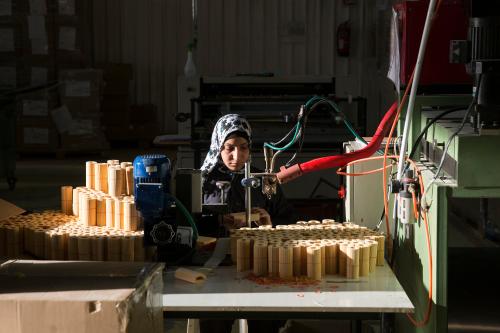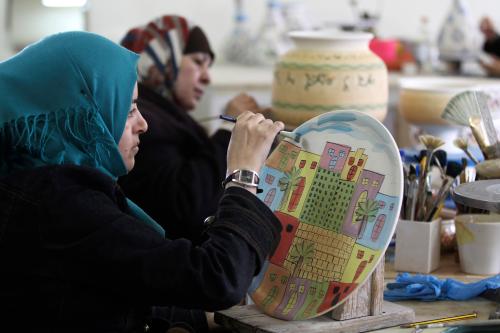Female workforce participation in Jordan is among the lowest in the region of the Middle East and North Africa. This means that Jordan is missing a significant share of its qualified workforce that could strengthen its economic development and help maximize its growth premium. And though Jordan has achieved parity in access to education in both primary and secondary schools, Jordanian women’s educational achievements are not being reflected in their participation in the economy.
The private sector and the government have intensified efforts to tackle barriers that prevent women from entering the workforce, including incentive systems, like the voucher system, and female-friendly policies, like the provision of child care centers. Despite these efforts, the “culture of work” in Jordan remains a persistent barrier for women and economics, or what can be called “womenomics.” Moreover, a woman’s decision to enter the workforce is often made by the male members of her family, who are likely to weigh the social consequences of her leaving home for family cohesion.
Promoting women’s participation in the workforce is not an easy task. It requires a shift in the subjective beliefs about women and economic life. Building on the social theory of belief mediation, Alexander and Welzel (2010) suggest that in order to achieve the economic empowerment of women, society would need to view women’s economic empowerment as being both “desirable” and “legitimate.” For Jordan, this means that female-friendly employment services, incentive systems and policies (i.e., objective conditions) must be coupled with a corresponding change in people’s mindset (i.e., subjective beliefs) about women in the workforce.
Shaping beliefs and values about the gendered division of labor starts early in a child’s life, through the family, society and the school system.
Shaping beliefs and values about the gendered division of labor starts early in a child’s life, through the family, society and the school system. This study explores the role of the school curriculum, specifically the direct and hidden gender biases in textbooks, as a tool for the socialization of cultural and ideological messages about women and economic life. In doing so, this study evaluates the current desirability of women’s economic empowerment through a systematic analysis of four subjects in the Jordanian national curriculum for grades 4 through 10.
In order to evaluate the legitimacy of the practice of women’s economic empowerment, this study examines the gendered division of labor, especially the leadership structure, in the work environment, using the Ministry of Education (MoE) as a sample workplace. This analysis is based on an interpretation of Alexander and Welzel’s (2010) theory that the greater the number of women role modeling positions of decisionmaking and leadership, the stronger the legitimacy behind the notion that women can take control of their economic and political lives.
This study’s pertinent research findings for Jordan vis-à-vis the desirability and legitimacy of women’s economic empowerment include the following:
- Only a few culturally acceptable and economically feasible professional and public sector jobs are assigned to women (e.g., teachers).
- It is more desirable for females to stay home.
- The curriculum prepares women to enter the marriage market rather than the labor market.
- Women who work outside the home will not be able to meet their family’s demands and expectations and their family responsibilities.
- Women are given very little control of finances and are afforded only limited mobility.
- Men are portrayed as being more entrepreneurial than women.
- There is a distinct absence of women performing productive tasks and an overrepresentation of women performing reproductive tasks.
- Females are represented in subordinate positions, while men are represented as leaders.









